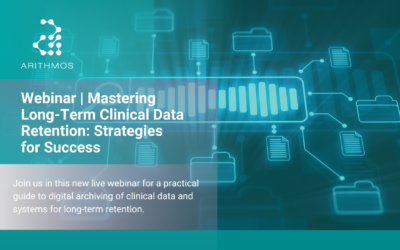Artificial Intelligence (AI) is a hot topic in the world of clinical trials, with researchers, academics and industry experts examining how it can “change the rules of the game”. Arithmos strives to be at the forefront of digital transformation in life sciences, so on the 18th of September we were present at the conference “Artificial Intelligence and Clinical Research” (Intelligenza artificiale e ricerca clinica) to get the latest updates from the industry. It took place at Politecnico di Milano, the largest technical university in Italy and looked at analyzing the possibility of simplifying the clinical research process with Artificial Intelligence.
The event featured such speakers as:
- Massimo Beccaria, Managing Director Alfa Technologies International;
- Giuseppe Recchia, Vice President Medical Scientific, GSK;
- Matteo Matteucci, Associate Professor of Politecnico di Milano (Robotics, Cognitive Robotics, and Machine Learning);
- Roberto Fantino, Presidente NAT Style;
- Enrico G. Caiani: Associate Professor of Politecnico di Milano, Chairman WG e-Cardiology European Society of Cardiology, Docente eHealth and Bioengineering;
- Giorgio Manfredi, CEO Rumbletumbleweed, CEO Occambee, Founder Forever Identity Inc., Advisor ISMC;
- Maurizio Viviani, CEO Strong Artificial Intelligence;
- Ettore Murciano, VP Channel Sales and Alliances, Loop AI Labs Inc;
- Eugenio Santoro, Responsabile del laboratorio di informatica medica, Istituto di Ricerche Farmacologiche Mario Negri – IRCCS;
- Sergio Scaccabarozzi, Head of Country Clinical Operations-Italy, Roche.
All the speeches represented very interesting insights from various points of view – research center, private company or university. What were some key points we took home? We first look at how the industry is being setup to look for AI solutions:
Giuseppe Recchia, Vice President Medical Scientific, GSK:
- The future of clinical research will be defined between 2018 and 2020;
- The whole revolution in clinical trials is about searching for a solution for faster development of the cure;
- Everything in clinical trials revolves around patients and gives birth to such notions as patient centricity and patient engagement. With time how the patient views himself has also changed:
- Patient now does his own research, using his/her health data;
- Patients now have their own input, for example, they are involved in medicine R&D;
- Patient-expert is a new concept, formed only recently. Such patients have the experience of the illness and expertise. For example, they could have had training or understanding of the research dynamics and the regulatory basis.
- The aim of modernizing Clinical Trials is getting us to the cure faster. Why is the process so lengthy now? There are several reasons: low enrollment rates, retention problems, adherence (patients do not take meds and says he/she does), quality, costs.
- What are the steps in clinical trial modernization?
- First step is developing patient centricity:
- Second step is connecting to the patient. It is extremely important now, as siteless clinical trials are being developed because patient spend more time at home than at the research site.
- Third step is modernization in the field of wearables;
- Fourth step is taming big data;
- Fifth and last step is applying AI in clinical trials;
- Right now no pharma company applies these technologies at 100%, however, big steps are already being taken in this direction.
Enrico G. Caiani: Associate Professor of Politecnico di Milano, Chairman WG e-Cardiology European Society of Cardiology, Docente eHealth and Bioengineering:
- Why does health care need AI? There are several main reasons:
- For the quantity of data and its complexity: at the moment each person generated 1100 TRB during his/her lifetime;
- For the sake of patient safety;
- For achieving higher efficiency in terms of time;
- AI is capable of changing the future of medicines in all its aspects from administrative to clinical;
- The demand for AI in the scientific society grows every year: in 2013 at ESC Congress there were only 3 AI presentations and in 2018 – already 69;
- What prevents AI from being adopted right away in clinical practice?
- Pathology is always complex, so here having a big dataset is of ultimate importance. This enlarges costs and times for the medical data production. Moreover, since healthcare datasets are not usually shared, the possibility of using joint datasets is not available.
- The clinical evidence is not sufficient since now there is a limited amount of evidence in research literature that can prove that AI is a superior technique.
- This, in turn, triggers another barrier for AI adoption: lack of transparency on training, lack of information on timing and content of updates, lack of reports on performance and eventual fails;
- Last, but not the least: the definition of ethical principles in AI is missing. In order to proceed with AI adoption, it should be clarified how AI can influence doctor-patient relations and decide who is responsible for errors caused by AI.
Eugenio Santoro, Responsabile del laboratorio di informatica medica, Istituto di Ricerche Farmacologiche Mario Negri – IRCCS:
- What should be done in order to use AI in clinical research?
- A structured approach should be implemented, as 80% of the data generated every day is not structured. Right now a huge amount of data is produced due to the use of smartphones, IoT and wearables, which has no formal system. The situation got escalated in the last 2 years – during which 90% of the world data was generated.
- What is the potential of AI in healthcare?
- Prevention and predictive models;
- Early diagnosis;
- Machine learning and chatbot;
- Analyses of disease cause-effect, also called epidemiology 2.0. AI is employed here for finding possible logical connections between potential cause and effect;
- Drug Discovery and clinical trials;
- How can AI improve clinical research in particular:
- Aggregation and synthesis of information: AI allows intuitive searches in the world biomedical research data including biomedical databases;
- Recruiting for clinical trials: AI can analyze medical records and other unstructured documents to find the appropriate patients for clinical trials and can accelerate recruitment to complete the clinical trial faster.
- Understanding the mechanism of disease: AI can analyzes databases, connecting published literature, experimental data, and clinical data and allows researchers to get insight into how the disease mechanism operates;
- Repurposing existing drugs: AI can synthesize knowledge from multiple biomedical sources and find new indications for existing drugs;
- Generate novel drug candidates: AI can generate novel drug candidates faster;
- Optimize clinical trials: AI can analyze data of participants and reduce the dropout rates through personalized communication;
- Publish data: AI can write a draft of a scientific manuscript based on provided data;
- Sentiment analysis: AI can assist in the pharmacovigilance process by monitoring the adverse events and help with the study of public health, such as infection and drug abuse.




